Events
Writing the Arts
with John Threlfall
Summary of the event that took place on
Thursday, November 29, 2012
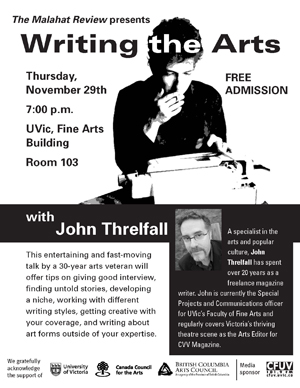
by Matthew Miller with comments by John Threlfall
poster by Ellen Rooney
photos by Simone Littledale
On November 29, 2012 John Threlfall shared his views on the life and craft Writing the Arts. Here's what you missed.
What we mean when we talk about John Threlfall
John Threlfall is not an arts writer who fits neatly inside a short introduction. Specialist in popular culture is a good place to start (so is this biographical link ). John Barton, Malahat editor and emcee for Writing The Arts, ticks off Threlfall's life in stage, page, and radio. And television. And online. By the time Threlfall takes the platform those of us gathered here know everything, he says, except his shoe size and telephone number. [Size 9, actually, and a lot of people call our house just to hear our ever-changing answering-machine messages, which I've been custom-recording since 1984. — J.T.] And right away we know two things. He's funny and he loves what he does.
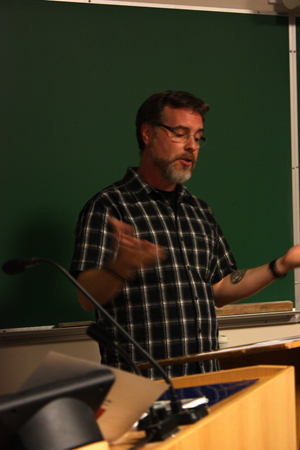
It's also clear writing the arts is not a sideline event. His success is due, in part, to observing the arts while participating in them fully.
Seeing John in person, gesturing as he warms up his words, I realize he's not delivering a typical presentation. There is nothing, well, artsy. No slides. No special effects. Instead, we are in for earnest conversation and some memorable one-liners: "People read the news to get the news; people read the arts to be told a story." I can't help thinking he's like someone's well-read younger brother at a kitchen party. He's casual and quick talking, relaxed yet tightly packed with anecdotes and advice burnished by twenty years of crafting a life in the arts.
"You can make money writing for the arts."
John does, ergo, so can you, by writing articles in these four categories. [Just make sure you have a day job, unless you're one of the dwindling few—like the Globe & Mail's Marsha Lederman or the TC's Adrian Chamberlain—who can make arts writing their full-time gig. —J.T.]
• The preview (400-600 words written for multiple markets)
• The review (800 words crafted on opening night when a show is coming together for the first time)
• The interview (800 words, somewhat easier and more interesting to do)
• The feature (various lengths based on your idea)
If you think you can write for the arts, you probably can
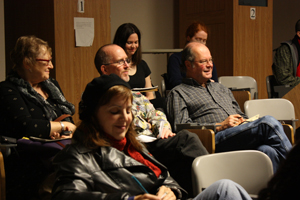
The secret is to be a generalist with a niche. While John is a self-described "theatre specialist and a generalist in about everything else," he has an impressive, and seemingly unrelated, number of niche areas: James Bond, Orange Crush, witchcraft, and the construction of modern time at the end of the 19th century. [Of course, these are all related by two things: my own personal interests and the articles I've written about them, which should go hand-in-hand for any writer. —J.T.] Clearly, it helps to have more than one niche.
The best approach to getting paid, he says in answer to an audience question, is to pitch and sell your idea for a piece to an editor before committing a single word to the page.
Writing is a metaphor for [insert something meaningful here]
"A story is a fishing expedition," he says. "Never let your reader off the line." Well if that's true, then writing for the arts is like a camping expedition made more enjoyable when you pack the right tools and cultivate specific survival skills. Here's John's partial list.
Simple tools are best
• Small notebook (laptops just get in the way)
• Extra pen
• Business cards
• Light-up pen [Since a lot of arts writing tends to happen in the dark, I find this an invaluable tool. —J.T.]
Skills
• Take notes without looking at your page
• Create your own speed-writing shorthand
• Develop an ability to remember faces
• Gossip without giving anything away in return (unless you benefit from it somehow)
• Learn how to create story ideas from anything [e.g.: Reading a theatre program, perusing an artist's statement, engaging in opening night chit-chat, listening between the notes at a concert . . . —J.T.]
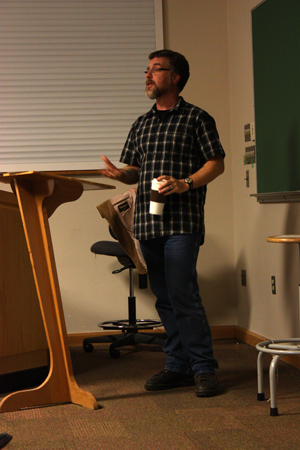 Survival tactics
Survival tactics
• Grow a thick skin
• Protect your ears at concerts: use earplugs [Seriously: if you plan to be a rock writer, this cannot be understated. I have less than half-hearing in one of my ears due to decades of excessive concert volume. —J.T.]
• Avoid hyperbole and clichés like the plague to end all plagues [Uh, right. —J.T.]
Making a pitch
• Do your research—know what your market wants [Fastest way to fail? Send the wrong pitch to the wrong magazine. —J.T.]
• No pitch should ever exceed a single page [Follow the four paragraph rule: the first graph hooks the editor, the second fills out the story, the third covers the basics—delivery date, story length, photo potential, etc.—and the fourth makes it clear why you're the right writer for the piece. —J.T.]
• Don't spend too long writing it [Crafting a good, tight pitch is one of the freelancer's most essential skills. Not only does it help shape the piece in your head, but it also provides a blueprint for the actual writing process. Here's an exercise: if you send out two pitches a week for two months to various media outlets, that's 16 potential articles; how many did you actually sell? —J.T.]
The art of the interview
• Be punctual [It's just good manners. —J.T.]
• Be interested and come informed [The more you know about them, the more your subject will be interested in talking. —J.T.]
• Have a conversation, not just a series of surface questions
• Make eye contact with your subject
• Know how to ask a question and what type of question to ask [Never ask questions that can be answered with a single word. —J.T.]
• Ask an interviewee what they think the story is
• Be a good listener
Reviewing
• Attend the event about which you are writing [Surprisingly, many writers don't—reviewers must, but if you preview an event, it's good practice to attend it as well. —J.T.]
• If you are unfamiliar with a subject (opera, for example) take a friend to the event who knows all about it and ask questions about what worked or didn't work
• It's okay not to give a standing ovation [Absolutely: standing ovations should be reserved for performances that are truly outstanding, not for something that has simply ended. If everyone else is standing up and I don't think it's worth it, I avoid peer pressure by pretending to be making notes. —J.T.]
• Talk to people at the edge of the story to glean the inside scoop (the box office attendant, the server, usher, etc.)
• Don't spend more time writing your review than it took you to cover the event
• Give credit where it's due [Remember, the arts are as much about the people behind the stage as those upon it. —J.T.]

Career tips
• Cultivate a solid work ethic
• Build a reputable portfolio
• Find a mentor
• Ask what people are interested in reading about to uncover a market for your piece
Arts writing inspirations
99% Invisible [podast]
The Memory Palace [podcast]
Desert Island Discs [BBC interview archive]
Marsha Lederman [Globe & Mail arts writer]
Ask me a question about that later
It's a line John says a few times between anecdotes. I take him up on that when we meet at Habit Coffee about a week later after pitching him for an anti-interview. I have just one question. What do you think readers have missed by not attending your event? "The questions," he says. It's true. Audience questions trigger more stories, more advice, more encouragement than any list or text on writing ever could. The answers are just as important and they all shared these themes: Attend arts events. Be Brave. Be yourself. Collect experiences. Tell your version of the story.
The best advice is last
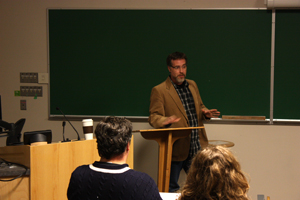
"People should be finished the article before they realized they've started it. Your writing should never give them a chance to stop reading." [Again, think about that fishing line: hook them off the top and then reel them in, right through to the end. —J.T.]
**On Tuesday, November 6th, John Threlfall appeared on U in the Ring, CFUV 101.9 FM to discuss his work, and this workshop. Listen to the podcast here.

Media Sponsor
See all event photos on facebook.









